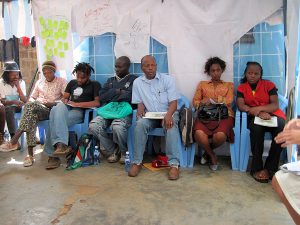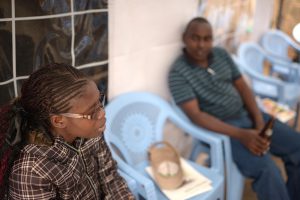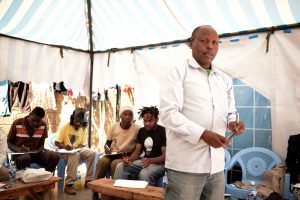The NCPD was asked to hold a dialogue training for a group of people from the biggest slum in Africa – the Kibera. This slum is in Nairobi and the population here has been through some hard conflicts between different tribe groups.
That conflict motivated some of the inhabitants to do something to prevent such conflicts in the future. With help from Daniel Breivick from the USA, and a local organisation called Kibera Pride, they decided to train a group of inhabitants in dialogue and conflict transformation.
The first days – identity and communication
A group of 20 people, mostly men, from the slum were attending the first day of the five-day workshop. Their backgrounds are different, but most of them are engaged in one or several social projects in the slum area and they were very much looking for more skills for solving conflicts in their community.
The first two days the participants worked on identity and communication. The participants were unknown with the way of touching upon these issues, but they appreciated it very much. Getting more aware of their own communication was important for the group. One of the participants said that this training will truly help them to do their work in the slums.
On the third day, the workshop was well established. The participants trusted each other and were curious about what would happen next. The day started with a reflection about the day before., where several of the participants mentioned how they got aware of their listening skills or the lack of such. The focus was still on communication, but more about what influences our way of communicating.
The first issue was observation. Through different exercises the participants got aware of how difficult it is to observe without interpreting. The exercises created much joy, but also an understanding of how important it might be not to interpret all we observe at once. Later the group worked on how our experiences are related to our feelings. Each participant had to come up with an example from their own life, something the group seemed to like very much.
Fourth day – anger management

Anger is a strong emotion, which might have big consequences for the development of conflict. The participants worked in groups on different questions related to anger. Much of the outcome was that anger in Kenya often creates violence, and the participants considered it as important to become more aware of how to deal with it.
The end of the day was related of the issue of values. The participants worked on an exercise called the king and the queen, which is about values and making decisions based on them. This exercise caused a lot of discussion and emotional reactions, like irritations, disagreements and reflections about moral judgements. After the exercise the group worked on their own values and how these values influenced their lives.
What is a conflict and which types of conflicts do we have? These questions brought the group to map a conflict from their community. The participants choose conflicts which had occurred currently and one could see that they still were emotional affected by them.
Fith day – analysis
Analysing conflicts of your own choice is a challenging exercise. What are the root causes of the conflict, the core problem and effects on the community? Conflicts make us confused and we easily loose the overview. For transforming conflicts in a positive development, it is helpful to map and analyse them. After analysing the general part of it, the small groups had to analyse each part of the conflict by asking themselves what are the needs, the interest and the positions involved? This analysis gives a deeper inside of what the conflict is about and how it might be addressed.
Despite the heat in the tent that day, the participants worked hard and came up with interesting reflections. It became clear that it isn’t easy to analyse the different parts of a conflict without generalising. A good analysis is a great preparation for an open dialogue process, where needs, interest and position can be addressed by questions and active listening.
Sixth day in – what is dialogue?

The day started with the presentation of the Nansen Dialogue Approach. The first big question; what is dialogue? Comparing dialogue with debate was a good a start. One important part of dialogue is creating trust. The participants were divided in small groups for sharing with each other stories of mistrust. For many participants talking about mistrust was quite emotional, and reminded them that being treated in that way hurts. Humans like to be trusted, so the question is how to create trust?
Trust is strongly linked to respect and empathy. One participant elaborated; without self respect, it is quite difficult to respect others. The group formulated that trust is like ‘fresh food’. It can easily get demolished if you do not protect it from disrespect and ignorance.
From this prospective the participants worked on different elements of a dialogue, exploring if there are elements which are difficult to implement in their society.
Equality was one of the elements they considered as difficult to implement in the Kenyan context. As several participants mentioned, there is no equality in the society, because those in power positions will always treat others as inferior. How to overcome that is the question. For us at the NCPD, dialogue is the way of overcoming it, but to do that, one has to bring the powerful and the powerless together.
The training ended with creating dialogue sessions based on the conflict mappings. Each group had to prepare and implement a session, where one or two had to take the role of the facilitator. While one group was implementing the dialogue, the others had to observe the session, and later give feedback to the role of the facilitator. The participants considered it at as a very useful exercise, since they had to play roles from their own conflict. That meant they had to put themselves into the shoes of those they maybe had been in conflict with.
‘Through this workshop I got much more aware of my way of communicating and I also saw that it is possible to teach others in a humble way. In a way where no answer or question is ridiculous or meaningless’, one participant said. Others talked about how useful this training was for them and that they will use it in their work in the slum of Kibera.
Living in the slum

Surviving is the first and last task. Poverty and the fight for survival creates a lot of conflicts, so poor people are often oppressed and dependant on others for things such as small job opportunities, free feeding programs, charity and people who have solidarity with their situation. Poverty in slums gives the feeling of being nothing, and thus a burden to the society.
Poor people will be misused by political parties, who pay them for attending their campaigns, by corrupt teachers, who ask the parents for fees which they put in their own pockets and by landlords, who increase the rent so much that not even living in the slum is possible. Oppressed people loose their self-confidence, their dignity and their self-esteem.
They miss also their voice, as one of the participants mentioned. They do not talk any more, not about their situation, not about injustice – they survive.
Dialogue is a wonderful and powerful way of bringing oppressed people to talk, it has no right or wrong answers or questions, everybody can participate, and it can give the speechless a voice, and through that create empowerment.
Living in a slum is not the end, it is not a one way road. People can get out of it, as far as someone gives them the opportunity to get back their voice – to be heard and seen.
The work in Kibera has only started – but training dialogue facilitators in the slum of Nairobi is some of the most meaningful work I have done!
-By Christiane Seehausen